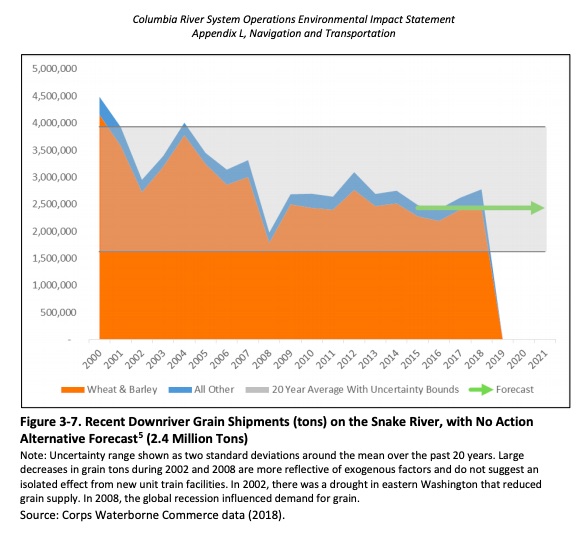forum
library
tutorial
contact

Columbia Grain CEO: 'Cooler, Smarter Heads'
Will Prevail on Snake River Dams
by Matthew Weaver
Capital Press, August 22, 2022
|
the film forum library tutorial contact |

|
Columbia Grain CEO: 'Cooler, Smarter Heads'
by Matthew Weaver
|
Recovery plans for the species say that additional improvements
in survival through the hydroelectric system are necessary.
 The leader of a top international grain supplier gives "low odds" that the lower Snake River dams will ever be breached and predicts that "cooler heads" will continue to prevail.
The leader of a top international grain supplier gives "low odds" that the lower Snake River dams will ever be breached and predicts that "cooler heads" will continue to prevail.
"I think we hear about it a lot, I just think that lately cooler heads, smarter heads have been prevailing," Columbia Grain International president and CEO Jeff Van Pevenage told the Capital Press. "I think that will help hold it in place for some time."
As an indicator, Van Pevenage cited NOAA's recent decision to continue to list spring chinook salmon on the river as threatened instead of endangered in the agency's five-year review of the species.
Recovery plans for the species say that additional improvements in survival through the hydroelectric system are necessary. However, they do not explicitly call for breaching the four lower Snake River dams, nor do the five-year reviews analyze breaching the dams, according to NOAA.
"That helps our cause of saving the dams," Van Pevenage said.
A solution must balance the needs of all stakeholders to address the challenges that salmon face throughout their life cycle, Van Pevenage said. In a press release, he called dam breaching "a simplistic and extreme concept that does not fully address the problem."
He praised the U.S. Army Corps of Engineers for researching and improving fish ladders and fish transportation downstream to boost survival rates.
But agricultural interests cannot become complacent, he said.
"We have to continue to voice ourselves, because you never know what can happen in today's crazy political world," he said. "We've got to stay on top of it, not just sit back and say, 'It's common sense that we need them, they'll never do it.'"
The majority of Columbia Grain's up-country white wheat and hard red winter wheat travels on the Snake River, Van Pevenage said. The company's export arm originates most of the grain barge traffic on the Snake River.
About 60% of the wheat exported from the Pacific Northwest moves on barges. That's between 80 million and 100 million bushels a year, he said.
Losing the dams would mean pushing all grain movement to rail and truck, he said.
"I can tell you, if you're relying strictly on rail, it's going to be a broken system," he said. "It's a big deal to us to continue to do what we can do to make sure we have a viable barge system through the Snake and Columbia rivers."
learn more on topics covered in the film
see the video
read the script
learn the songs
discussion forum
